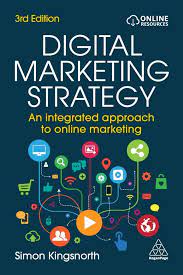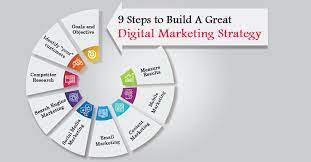The Importance of a Strong Digital Media Strategy
In today’s digital age, having a well-defined digital media strategy is crucial for any business looking to succeed online. A digital media strategy encompasses the use of various online platforms and channels to effectively reach and engage with your target audience. It involves planning, implementing, and monitoring digital marketing efforts to achieve specific goals and objectives.
Key Components of a Digital Media Strategy
A robust digital media strategy typically includes the following key components:
- Target Audience Analysis: Understanding your target audience’s demographics, preferences, and online behaviour is essential for crafting relevant and engaging content.
- Content Creation: Developing high-quality and valuable content that resonates with your audience across different digital channels, such as social media, websites, blogs, and email.
- Social Media Management: Leveraging social media platforms to build brand awareness, drive traffic to your website, and engage with customers in real-time.
- Search Engine Optimization (SEO): Optimising your online content to improve its visibility in search engine results pages and attract organic traffic.
- Paid Advertising: Utilising pay-per-click (PPC) advertising campaigns on search engines and social media platforms to reach a wider audience and drive conversions.
- Data Analytics: Monitoring and analysing key performance indicators (KPIs) to measure the effectiveness of your digital media efforts and make data-driven decisions for future strategies.
The Benefits of an Effective Digital Media Strategy
An effective digital media strategy offers numerous benefits for businesses, including:
- Increased Brand Awareness: By consistently engaging with your target audience through various digital channels, you can enhance brand visibility and recognition.
- Improved Customer Engagement: Interactive content and personalised messaging can foster meaningful relationships with customers and encourage loyalty.
- Enhanced Conversion Rates: Targeted digital marketing campaigns can drive qualified leads to your website and convert them into paying customers more effectively.
- Better ROI: By tracking the performance of your digital media activities, you can optimise your strategies for maximum return on investment (ROI).
In conclusion, a well-crafted digital media strategy is essential for businesses seeking to thrive in the competitive online landscape. By understanding your audience, creating compelling content, leveraging various digital channels effectively, and measuring success through analytics, you can establish a strong online presence that drives growth and success for your business.
Top 5 Tips for Crafting an Effective Digital Media Strategy
- Understand your target audience and tailor your content to their preferences.
- Stay updated with current trends and technologies in the digital media landscape.
- Engage with your audience through interactive content such as polls, quizzes, and live videos.
- Utilise analytics tools to track the performance of your digital media campaigns and make data-driven decisions.
- Collaborate with influencers or other brands to expand your reach and increase brand awareness.
Understand your target audience and tailor your content to their preferences.
To create a successful digital media strategy, it is crucial to understand your target audience thoroughly and tailor your content to meet their preferences and needs. By conducting detailed research on their demographics, behaviours, and interests, you can develop content that resonates with them and drives engagement. Personalising your messaging and delivering relevant information not only strengthens your connection with the audience but also increases the likelihood of achieving your marketing objectives effectively.
Stay updated with current trends and technologies in the digital media landscape.
To stay ahead in the ever-evolving digital media landscape, it is crucial to remain informed and aware of current trends and technologies. By staying updated, businesses can adapt their digital media strategies to leverage new opportunities, reach their target audience more effectively, and stay competitive in the online market. Keeping abreast of emerging trends allows companies to innovate, engage with their audience in meaningful ways, and ensure that their digital presence remains relevant and impactful. Embracing new technologies and trends can help businesses stay at the forefront of digital marketing and maintain a strong position in an increasingly dynamic online environment.
Engage with your audience through interactive content such as polls, quizzes, and live videos.
To enhance your digital media strategy, it is essential to engage with your audience through interactive content such as polls, quizzes, and live videos. By incorporating these elements into your online presence, you can create a more dynamic and engaging experience for your audience. Interactive content not only captures attention but also encourages active participation, fostering a sense of connection and community with your brand. This approach not only entertains and educates but also provides valuable insights into your audience’s preferences and interests, allowing you to tailor future content to better meet their needs.
Utilise analytics tools to track the performance of your digital media campaigns and make data-driven decisions.
To maximise the effectiveness of your digital media campaigns, it is essential to utilise analytics tools to monitor and evaluate their performance. By tracking key metrics such as website traffic, engagement rates, conversion rates, and social media interactions, you can gain valuable insights into what is working well and what areas may require adjustment. This data-driven approach enables you to make informed decisions, optimise your strategies for better results, and ultimately enhance the overall success of your digital media efforts.
Collaborate with influencers or other brands to expand your reach and increase brand awareness.
Collaborating with influencers or other brands is a powerful strategy to expand your reach and boost brand awareness in the digital landscape. By partnering with influencers who have a strong following and credibility in your industry, you can tap into their audience and leverage their influence to promote your brand authentically. Similarly, teaming up with complementary brands allows you to reach new customer segments and enhance your brand’s visibility through mutual endorsements. These collaborations not only widen your online presence but also build trust among consumers, ultimately driving engagement and fostering brand loyalty.


